Jasmina and Urban cemaz jars, 2020 spring harvest (Photo by Jasmina Kozina)
News
19 May 2020, 20:52 PM
STA, 19 May 2020 - The Department of Infectious Diseases at the Ljubljana University Medical Centre (UKC) will start offering self-pay testing for the novel coronavirus from Thursday at the price of EUR 93.
UKC Ljubljana said that those wishing to undergo testing should register online, while more information would be available on Wednesday.
Testing for Sars-CoV-2 has been available widely free of charge to anyone showing symptoms, which is expected to continue to be available by referral through the person's GP.
Government data show that roughly 71,000 tests have been conducted in the country so far, with 1,467 people testing positive since the first Sars-CoV-2 infection was confirmed in the country on 4 March.
The epidemic, which has claimed 104 lives, has all but died down with just one or no cases recorded daily for the past six days.
As a result of the situation, UKC Ljubljana will close down a separate Covid-19 entrance to its emergency department made up of tents and containers at the end of this week.
Under special conditions, the unit for hepatitis B and C and HIV testing will resume its work after being suspended during the Covid-19 epidemic. Those wishing to take tests will need to register online.
19 May 2020, 18:16 PM
Am I unique in finding that coming out of lockdown is almost as stressful as going into it?
Having got accustomed to my leper like existence, the prospect of establishing a full social life is rather daunting. Trying to plan and keep upbeat in a very uncertain new world, re-establishing a ‘normal’ circadian rhythm and hoping to maintain a semblance of normality by June.
Related: Going Through the Coronavirus Grief Cycle in Slovenia
Last night, as the rain lashed down and put paid to my dinner ‘out’ in the city, and with no TLC within easy flying distance, I decided to indulge myself with a newly permitted massage. And I chose my favourite – Chinese massage by Megy.

Megy
I discovered Megy and the Kang TKM Centre (with TKM standing for Tradicionalne Kitajske Medicine) in the rather unassuming Rojcev Ulica 24, behind trznica Moste, parked under the high rises next to the pharmacy. It offers Chinese medicines, acupuncture and massage at very reasonable prices, and on my last back twinge in December, I decided to give it a go. And touch wood, I haven’t had a back twinge since.
I have now been for many basic massages with Megy, and found them to be excellent – very similar to Vietnamese, and very effective in dealing with back pain . She often supplements the treatment, with your permission, with cupping and acupuncture. Both painless, and in my experience extremely effective.

In the spotlessly clean almost clinical waiting room awaits the friendly face of white coated Megy. Megy speaks a little Slovenian, and with the help of her medical knowledge, Google Translate, her Slovenian husband and mime, she can prescribe and deliver the most appropriate and efficacious treatment – unless you merely want a straightforward head, foot or body massage whereby you simply point at the very reasonably priced ‘menu’.

Last night, she took one look at my dishevelled appearance, and stress worn visage, and took control.
She started with a brisk body massage, and then commenced cupping. From experience, I knew that the cupping helps with local pain relief and muscle relaxation, while it also improves overall mental and physical health by removing the energy blockages which prevent the flow of healthy energy or ‘qi’. It also stimulates the vital organs into releasing their toxins; and I could actually feel a faint fluttering in my belly as it did its work.

Cupping
After the very relaxing cupping, Megy performed the popular form of Chinese medicine called ‘moxibustion’ consisting of small fires. I must admit I was slightly apprehensive at first, but fear not - it was a wonderfully relaxing experience, and I fell into an alpha wave type meditation – completely calm, as small fires smoked fragrantly and painlessly on my back.
In effect, moxibustion involves the burning of small pleasantly scented ‘mox’ fires (in pots) along your back (chakra). The Ai Ye smoke released from burning the mixture of dried leaves has an anti-bacterial effect and is said to also have an inhibitory effect on various viruses including the common cold, and who knows, maybe even the dreaded Coronavirus. All in all, it has a very soothing effect – so just lie back and enjoy it. It certainly de-stressed me, and today I have completely got rid of the sniffling beginnings of a cold, along with my lockdown lethargy.
I left two hours later, a new woman, and went straight to bed and into a long and untroubled sleep. I can highly recommend Megy and her treatments, as being an excellent antidote to all lockdown maladies including headache and backache.
If you’d like to visit Megy for a treatment, then you can book an appointment on her Facebook page, while the telephone number is 040554 940 or 040 707 440. You can find out more about Carol Jardine at her website, SpeakEasy English.
19 May 2020, 15:21 PM
STA, 19 May 2020 - Plans have been set in motion to upgrade the railway network in the greater Ljubljana area, with the Infrastructure Ministry determining the existing railways leading from Ljubljana to Kamnik in the north and to the south-eastern border as priority.
The ministry said on Tuesday that Minister Jernej Vrtovec had tasked the public company for public railway infrastructure engineering to start siting the projects.
The task has been commissioned based on an ongoing feasibility study related to upgrades of regional railway lines in Slovenia and the railway network in the greater Ljubljana area, officially called the Ljubljana Urban Region.
"The results of the study suggests that siting activities for the existing Kamnik railway - expanding it to two tracks and electrifying it - should be initiated as soon as possible," the ministry said.
As for the south-eastern railway leading to the border town of Metlika, the ministry said that it should be electrified and gradually expanded to two tracks, depending on the needs.
When it comes to the railway between Ljubljana and Vrhnika, some 20 km south-west, the ministry said that synergies should be sought with the road infrastructure to secure sustainable mobility.
All activities are expected to be focused on developing infrastructure for integrated public passenger transport, with the main goal being to reduce travel times and to make passenger train schedules more attractive to users.
19 May 2020, 13:34 PM
STA, 19 May 2020- Croatians are free to cross the border into Slovenia without having to undergo mandatory quarantine after Croatia became the first country Slovenia put on a list of countries whose nationals may enter without limitations.
The decision was made by the government late on Monday after the National Institute of Public Health assessed the situation in Croatia and determined that the risk to the spread of coronavirus is similar in both countries.
Accordingly, there is no need for Croatians to quarantine or self-isolate when they cross the border, the government said. Slovenian nationals and those with residence in Slovenia have been exempt from quarantine restrictions since last week.
Everyone entering Slovenia regardless of nationality may still be subject to a 14-day quarantine if they have spent more than two weeks outside the EU.
Slovenians are still subject to certain restrictions when they enter Croatia. They may enter if they have property or commercial interests in Croatia and have to produce evidence thereof, for example property deeds, at the border.
The decision to whitelist Croatia comes after Slovenia opted for a gradual approach to opening its borders.
The government decided that the bilateral technical agreements would be concluded with EU and Schengen Zone members on the passage of their citizens, until there is an agreement at the EU level on a reopening of borders.
There are many exceptions in place, including for daily commuters, hauliers and passengers in transit, but theoretically most foreigners thus remain subject to mandatory quarantine upon arrival.
Talks on reopening of borders are under way with other neighbouring countries as well.
Jelko Kacin, the government's coronavirus spokesman, said on Tuesday that restrictions on the border with Hungary were expected to be lifted by the end of the month pending an evaluation of the epidemiological situation there.
As for Austria, Kacin said such an agreement depended "on the responsiveness of the Austrian side", saying there were "quite a few dilemmas there," including with regard to one of the hotspots of the outbreak, the ski resort Ischgl.
"Once Austria has properly addressed these issues, we are confident that the conditions for such an agreement with Austria will be satisfied."
Economy Minister Zdravko Počivalšek yesterday held talks with Austrian Minister for Sustainability and Tourism Elisabeth Köstinger.
Kacin said Počivalšek had "very clearly voiced the expectation that we wish for a relaxation in the shortest possible time," noting that the Austrian-German border was set to reopen June, which gave Slovenia and Austria "quite some time before then".
With Italy, Slovenia expects "expert talks at the highest level" about the state of the epidemic there and forecasts, which would be followed by an operational agreement about when and under which conditions the border could reopen.
One more coronavirus infection, no new Covid-19 fatalities
STA, 19 May 2020 - Slovenia confirmed one more coronavirus infection on Monday, raising the total number of confirmed cases so far to 1,467, official data show. The national death toll remains at 104, as no new Covid-19 fatalities have been reported.
A total of 1,128 tests were performed yesterday, roughly on a par with the daily testing volume since the start of the epidemic.
The number of Covid-19 patients in hospitals dropped by one to 24, including five in intensive care - a figure that remained the same compared to Sunday.
19 May 2020, 09:18 AM
STA, 18 May 2020 - Hungarian Minister of Foreign Affairs and Trade Peter Szijjarto announced on Monday a gradual approach to lifting restrictions on the Slovenian-Hungarian border by 1 June after talks with Economy Minister Zdravko Počivalšek. The Slovenian minister confirmed the goal was to reopen borders in early June, provided a suitable epidemiological picture.
Szijjarto wrote on Facebook that relaunching the economy meant resuming international cooperation which includes easing border restrictions. People's health should not be put into jeopardy though, he highlighted in a post reposted by the Hungarian Press Agency MTI.
The Hungarian foreign minister added that he and Počivalšek agreed that both Slovenia and Hungary had successfully contained the coronavirus epidemic.
Szijjarto pointed out that trade between the two countries exceeded EUR 2.5 billion per year with close-knitted communities on both sides of the border.
In a post on his Twitter profile, Minister Počivalšek said that he had suggested stepping up procedures to reopen borders in his talks with the relevant ministers from Hungary and Austria.
The Slovenian minister added that protocols should be put in place on how to cross the border and that everything should be done "not to jeopardise our health in the process".
Slovenian government coronavirus spokesman Jelko Kacin announced on Sunday that Počivalšek would be holding talks today with both Szijjarto and Austrian Tourism Minister Elisabeth Köstinger.
In the wake of Sunday's government decision to take a more gradual approach to reopening Slovenia's borders to EU citizens, Kacin told the press today that the relevant strategy was focussed on preventing the cross-border spread of the virus.
A list of countries that will enjoy a restriction-free entry has not yet been delivered, however the government has said that it will be regularly updating the list taking into account epidemiological situations in individual countries, presented by the National Institute of Public Health, as well as agreements with member states and Schengen countries and EU-wide agreements.
There are no border restrictions for Slovenian citizens upon entering Slovenia though.
19 May 2020, 09:14 AM
STA, 18 May 2020 - The ruling coalition's majority in parliament has been reduced to 46 out of 90 seats after MP Gregor Židan defected from the Modern Centre Party (SMC) to the opposition Social Democrats (SD).
The latest defection was confirmed by SD deputy faction leader Matjaž Han, who said Židan had established he could perform his work better in accordance with the values of the SD deputy group.
Židan did not comment on his defection, with Han telling reporters on Monday that such decisions were difficult on individuals, which was why Židan would not be explaining himself to the media.
"But I believe he will be able to tell many more things still in the political arena through his actions and views," said Han.
Asked about the reasons for the move, Han noted that Židan had been a successful member of the Slovenian national football team, and that he had expressed his disappointment that some should "speak ill" of Slovenia and he did not want to be a member of such a team.
Židan is the second MP to leave the SMC after Jani Möderndorfer quit the party to join the ranks of the opposition faction of Marjan Šarec List (LMŠ) on Friday.
SMC leader Zdravko Počivalšek responded via Twitter with a pun on Židan's surname, which translates as jolly. "The jolly day for the sponsors of MP defections may be about to end," he tweeted.
However, the SMC deputy group expressed surprise by Židan's leaving "as he appeared to be comfortable within the new coalition".
The coalition faction regretted that individuals placed their own interests above common good, but also said that the departures "have contributed to the unity and determination of the remaining [SMC] deputies".
Židan was not elected to the National Assembly directly, but has been standing in as MP for Počivalšek since the latter was appointed economy minister.
Počivalšek served as economy minister in the Marjan Šarec minority government from 2018 until mid-March when his party helped form the Janez Janša government, where he continues in the same post.
The party's joining the centre-right government has prompted some members to quit, including the party founder Miro Cerar.
The SD deputy faction has increased its tally of seats at the National Assembly to 12, as the SMC's has been reduced to eight. The coalition of the SDS, SMC, NSi and DeSUS now has 46 seats.
19 May 2020, 07:03 AM
Check the date at the top of the page, and you can find all the "morning headlines" stories here. You can also follow us on Facebook and get all the news in your feed.
This summary is provided by the STA:
After opening borders, Slovenia opts for gradual approach
LJUBLJANA - Three days after opening Slovenia's borders to EU residents almost without exception, the government opted for a more gradual approach by determining that only citizens of EU and Schengen zone countries with which bilateral technical agreements are reached will be allowed to cross without restrictions. The government will yet determine the list of eligible countries and update it on an ongoing basis. Economy Minister Zdravko Počivalšek discussed reopening the borders with the relevant Hungarian and Austrian ministers saying the goal was to reopen borders with the neighbour countries in early June. In a videoconference with EU counterparts, Foreign Minister Anže Logar said Slovenia was ready to welcome tourists in the coming weeks.
Bulk of coronavirus restrictions lifted, schools reopen
LJUBLJANA - Children returned to schools and kindergartens as part of a major easing of quarantine restrictions in the country as Slovenia reopened kindergartens, primary schools for the first three grades and secondary schools for final-year students. Information from schools and kindergartens suggest the majority of eligible children and students returned and no major problems were reported. All shops were allowed to open and some shopping malls reported significant crowds. Bars and restaurants are allowed to serve their patrons indoor as well.
No new coronavirus infections, deaths
LJUBLJANA - No new coronavirus infections or deaths were recorded in Slovenia on Sunday after 479 tests were conducted. Twenty-five people were still in hospital with Covid-19, five of them in intensive care, government data show. The total number of infections in Slovenia so far remains at 1,466 and the death toll at 104. The number of people in hospitals dropped by one, while the number of patients in intensive care remains the same.
Trade unions, employers largely happy with short-time work scheme
LJUBLJANA - The Economic and Social Council's task force for labour market and social affairs largely harmonised measures from a draft third coronavirus stimulus package, most notably a planned scheme to subsidise a shorter work week. To prevent major job losses, safeguards were included under which the employers benefiting from the scheme could not lay off a larger number of workers for a month after they no longer get subsidies. The package is expected to be passed by the government on Tuesday.
Automotive industry says govt stimulus crucial for its survival
LJUBLJANA - The Slovenian automotive industry said it was seeing its worst crisis yet due to the coronavirus pandemic. The Automotive Cluster of Slovenia urged a follow-up on the first two stimulus packages to save the sector, warning of a loss of jobs and bankruptcies unless aid is extended. CEO of the Kolektor group, Radovan Bolko, reported that the automotive sector had seen a 60% drop in production in April and a 50% in May. No recovery is expected in June yet.
Tourism industry reopening tentatively
LJUBLJANA - Tourism companies were largely able to resume business today, and travelling appears to be in demand again, although agritourism providers, campsites and beaches are still relatively empty. A path to recovery is expected to be long after a two-month lockdown, so the Slovenian Hospitality Chamber (TGZS) and the Association of Natural Spas urged the government to extend until the end of the year the measures designed to help tourism cope with the coronavirus epidemic - especially the subsidies for idled workers - or else 20,000 jobs could be lost by the end of 2020.
LMŠ proposes EUR 1.8bn consumption boost
LJUBLJANA - The opposition Marjan Šarec List presented a proposal for a EUR 1.8 billion stimulus package focused on boosting demand, an aspect it said had been almost completely ignored by the government. The list of measures includes a EUR 400 tourism voucher and a temporary universal monthly basic income of EUR 100. Former PM Marjan Šarec, accompanied by economist Jože P. Damijan, tore apart the government's first two stimulus packages, saying they had failed to come to life in practice.
Junior coalition SMC loses another MP
LJUBLJANA - The ruling coalition's majority in parliament has been reduced to 46 out of 90 seats after MP Gregor Židan defected from the Modern Centre Party (SMC) to join the opposition faction of Social Democrats (SD). Židan would not comment on the move, but the SMC expressed surprise, while adding that the latest defections would consolidate rather than weaken the deputy group. Židan's departure comes after Jani Möderndorfer left for the opposition Marjan Šarec List (LMŠ) on Friday.
SDS firmly in lead, PM Janša slips in Vox Populi ranking
LJUBLJANA - The senior coalition Democratic Party (SDS) continues to lead the field in the latest Vox Populi poll for the newspapers Dnevnik and Večer. The SDS polled at 22.1% in the May survey, compared to 22.5% in April. The opposition Marjan Šarec List (LMŠ) in second gained 2.4 percentage points to 12.2%. The government's performance was assessed positively by 47.3% of the respondents. However, Prime Minister Janez Janša slipped eight spots to 15th on the ranking of politicians.
Asylum requests processed again after being on hold during epidemic
LJUBLJANA - The Interior Ministry confirmed it had restarted processing all asylum protection requests after it had put on hold cases it did not deem urgent during the coronavirus epidemic. The ministry, which is now processing 10 to 15 requests daily, assessed that applications for international protection that are conducted orally cannot be counted as urgent. The ministry received 563 asylum requests from January to the end of April, which compares to 1,111 at this time last year.
Slovenia advocates modernisation of education after Covid-19
BRUSSELS, Belgium - The EU ministers in charge of education discussed the reopening of schools in a videoconference. Slovenia's Education Ministry State Secretary Damir Orehovec announced the drafting of long-term strategic guidelines regarding the accessibility of remote learning with an emphasis on safe, stimulative and inclusive educational environment. Slovenia will advocate a positive approach to mobility and support virtual mobility, which however cannot replace physical activity.
Ministry to change environmental impact assessment rules
LJUBLJANA - The Environment Ministry has made a step towards simplifying procedures for investors by proposing changes that would allow them to skip the environmental impact assessment in cases when previous analyses show that no major impact on the environment is expected. Since 2014, the Environment Agency has decided in some 2,440 requests for a preliminary analysis or more than 40 a month on average. Only in 3.7% of the cases an environmental impact assessment was required.
Theatres struggling but hoping to come out on top of epidemic
LJUBLJANA - The longer theatres across Slovenia stay closed due to coronavirus concerns, the bigger the economic fallout they face. Theatres are presenting this year's projects that have been cancelled due to the pandemic and preparing for reopening with rehearsals about to kick off in the coming weeks. Theatres called on the government to provide safety guidelines and reopening timelines in cooperation with health experts as well as present the relevant financial situation.
Slovenian football great Marko Elsner dies
LJUBLJANA - Marko Elsner, one of the greatest Slovenian football players of all time, died at the age of 60 after battling a severe illness for several years. One of his finest moments was winning an Olympic bronze medal with the Yugoslav team in 1984. He played for the Yugoslav national team in 1984-1988, earning 14 caps, and also for the Slovenian team after the nation gained independence, making two caps - against Cyprus in November 1992 and against Estonia in April 1993.
If you're learning Slovenian then you can find all our dual texts here
18 May 2020, 18:30 PM
STA, 18 May 2020 - Tourism companies can largely resume doing business from today, and travel seems to be in demand again, although agritourism providers, campsites and beaches are still relatively empty. A path to recovery is expected to be long after a two-month lockdown, so the hospitality chamber has urged the government to extend state aid measures.
The Slovenian Hospitality Chamber (TGZS) called on the government on Monday to extend until the end of the year the measures designed to help tourism cope with the coronavirus epidemic.
It said there had been indications the subsidies for idled workers would be extended only by a month, or by the end of June, which would push the industry into a dire situation.
"Under this scenario, the companies will not be able to survive, so massive layoffs will follow in tourism on 1 July," the chamber said in a release.
If the measures applying to idled tourism workers are not prolonged until the end of 2020, some 20,000 workers will lose jobs, according to the chamber's estimate.
The TGZS meanwhile welcomed the planned EUR 200 vouchers for adult Slovenian citizens to be spent on a vacation in Slovenia, which it believes would help the industry start what is expected to be a years-long recovery.
Operators of campsites and beaches on the Slovenian coast are meanwhile largely ready to accept guests although the swimming season has not yet started.
The main beach in Portorož is to open on 15 June, or as early as 1 June if the weather is fine, Okolje Piran direktor Gašpar Gašpar Mišič told the STA.
The Strunjan Camping Site does not yet have any guests, and cannot predict how the situation develops in the coming weeks, although potential guests are already making enquires.
The situation is similar in agritourism, which can also start welcoming tourists as of today, but the majority of farms offering such activities will relaunch their business in June.
The Češnjice Tourist Farm in Cerklje na Gorenjskem, NW, told the STA they had no guests nor queries, while the first tourists will arrive at the Urška Tourist Farm near Zreče,E, on Thursday.
"We get lots of queries by e-mail and mobile phone, Germans are also interested in when we're opening," said the farm owner Urška Topolšek.
The pandemic has also hit hard tourist guides, most of whom are self-employed and largely depend on tourists from abroad.
Just like the rest of the tourism industry, they are now trying to attract Slovenian tourists, the Argos Regional Association of Tourist Guides said in a release.
Argos has thus joined the My Slovenia campaign launched by the Slovenian Tourism Board (STO) to encourage Slovenians to spend their holidays in Slovenia.
"The borders are slowly opening, but we share the view that this season, domestic guests will be in the focus. Which is right," said its president Mateja Kregar Gliha.
Skiing was relaunched at Kanin, Slovenia's only high-altitude ski slopes, where Slovenian professional skier Ilka Štuhec relaunched her training today.
"It's great to ski in Slovenia in May," said Štuhec, whom the pandemic has deprived of several weeks of training for the new ski season.
Slovenian travel agencies have however not yet opened their doors, but are providing information to potential clients online or over the phone.
There are still many uncertainties about the border crossing regime, protocols about bus and air travel, and about the reopening of hotels in Slovenia and abroad, Jože Režonja, Relax Turizem director, told the STA.
"We expect everything will be clear by 31 May at the latest, in which case we will open our offices on 1 June."
If things clear up earlier, the offices will open sooner. "We're ready," he said, adding that some 80% of their employees are on furlough.
Similarly, travel company Palma provides information to its potential clients over the phone and plans to open its offices on 1 June, said sales director Leni Petek Rovšnik.
She said people were eager to start travelling again, so she is quite optimistic that business could soon be revived.
The only tourism facilities that could not yet open today are accommodation facilities with over 30 rooms, accommodation for spa guests, wellness and fitness centres, pools and water parks.
All our stories on coronavirus are here
18 May 2020, 17:27 PM
It began, as I've found in many an uncanny occurrence in my life, by chance, in 2013, on Trubarjeva Cesta in Ljubljana. We had planned to spend six months in Slovenia, our longest stretch ever, and decided to rent.
I searched rentals on the internet, and located a one-room flat, and connected with the owners, Jasmina Kozina and Urban Propotnik, who operate a Ljubljana running club "for health" (Urbani tekači) and ended up as lifelong friends.
In an email flurry prior to leaving, Jasmina said she and Urban would pick us up at the airport, and take us to Trubarjeva, where they gave us the keys. In the kitchen we found gifts — fresh-baked bread and a small jar of green spread that was labelled čemaž, from Jasmina's mother.
For me, it was the beginning of a years’ long affection for and connection to this peculiar Slovenian concoction, often at the dismay of my spouse, Kate, who bears the brunt of wafting garlic.
In my hometown of Rock Springs, Wyoming, USA, where all four Slovenian grandparents settled and preserved Slovenian culture, I grew up with kranjska klobasa and kisla repa prepared by Slovenian immigrant neighbours. But not čemaž.
Čemaž is wild garlic, according to Wikipedia, botanically "Allium ursinum ... a bulbous perennial flowering plant in the amaryllis family." It grows prolifically across Slovenia and a good share of Europe.

Wild garlic growth, this spring (2020) on the hills near the Mura River. (Photo by Boris Bezjak)

Close-up, wild garlic growing this spring near the Mura River in northeastern Slovenia. (Photo by Boris Bezjak)
Spring brings the lush wild garlic, and as Slovenians have done for centuries, a harvest of those luscious green leaves. And some lurking danger, if you don’t pick the correct plant. Siol.net this year wrote that "in the last twenty years, more than thirty individuals have been treated ... infected with the autumn undergrowth, and four have died." But it's also easy to identify: simply "rub the leaf of the garlic between your fingers, it releases the smell of garlic."
After Jasmina's and Urban's gift, I was hooked. In our 2013 months in Slovenia I found it at the outdoor market, sold on stands on Trubarjeva and in stores.
So I bought jar after jar, spread it on bread, accompanied with cheese. It's become my breakfast staple, tomatoes now substituted to avoid those all-too-seductive but salty cheeses, doing a favour to keep my blood pressure down and to mesh with our newfound vegetarian diet (with gentle encouragement by Jasmina and Urban).
Jasmina's mother lives on the coast, near Piran and Portoroz. "My mom's basic recipe is to meld it with olive oil and salt and leave it in a big container," Jasmina said. "She makes from 50-100 litres. Then she takes it out as we consume it, let's say 5 litres per time. And sometimes we add things ... all kinds of seeds and nuts, other veggies, avocado and tofu."

Urban eyes, collects wild garlic this (2020) spring on Castle Hill in Ljubljana. (Photo by Jasmina Kozina)
During yet another sojourn in Slovenia in 2018, but this time with my new citizenship, another chance encounter. Sonja Bezjak said she had relatives in Wyoming, by coincidence, just north of my grandparents' locale in Rock Springs. Weeks later, she kindly drove us to her Slovenian home area for a visit, at Trate in northeast Slovenia.
Yet another adventure ensued — a float on the Mura River, inspired by Kate's reading of Murisa by Feri Lainscek, where we met dedicated locals working to block hydro projects on the pristine "Amazon of Europe."
Then, an invitation to dinner at Sonja’s parents' home. Along the way, we stopped, to pick up vegetables at her aunt's house. Sonja told her about my čemaž affinity, and handed me a jar of Aunt Pavla's version. Her recipe:
- · 600 g of čemaž
- · 15 g to 20 g of salt
- · 6 dl of olive oil
"First you wash the leaves, then you mix/cut them in blender (not too much), add salt and oil," Sonja related. "Keep it aside for one night. Then fill the jars, if needed add oil to cover the blended leaves. Your čemaž pesto is ready."
But Sonja also added, "my mother and my aunt are worried that you might mix the leaves with the poisonous leaves of lily of the valley, if you plan to pick it by yourself. I believe there is no čemaž in New Mexico, however maybe it’s worth noting in your article that there’s this danger." So I noted it, as you’ll remember! (In yet another coincidence, I recalled that my mother, who loved flowers, also grew lilies-of-the-valley in the front yard in Wyoming, so I do know what they look like.)
What NOT to eat - lilly of the valley. Photo: pxfuel
On the Mura, Jan, our raft guide, told us there was once a čemaž festival nearby. I was never able to track it down, but Jasmina said čemaž is often featured at food events.
One was in early 2018 at Terme Snovik, near Kamnik, "the first festival in Slovenia intended for spring healing cabbage," the organizers said. "Garlic or wild garlic or bear garlic ... is used in both cuisine and medicine." Events included lectures on preparing cuisine, field trips and talks on the leafy plant's healing power "known to the Romans, and passed down from generation to generation and proven by modern science."
As Jasmina noted, vegetables can be added to čemaž, for use at home. But if you dine out, one restaurant I found on the internet, Gostilna Repovž in Brezovica, features "čemaž soup."
For me, stranded in the USA in between sojourns to Slovenia, I'm on my own for my čemaž supply. I've never been able to find it, even in imported food stores.
So I've come up with my own recipe: What I find in my garden — chives, onions or leeks — supplemented with store-bought equivalents, and for a couple tall jars, two bulbs of peeled garlic cloves, or during spring, young soft garlic. It's all pureed with pumpkin seeds and olive oil, with a few sprinkles of vegetable salt and turmeric.

My ingredients for my most recent "cemaz" (OK, I added the purple onions for color in the photo shoot)

In this COVID-19 time, čemaž is probably no match for the sneaky virus. But garlic does have antibiotic properties, so it helps keeps me healthy. And a handy side effect: One of the symptoms of the virus is the loss of smell, so as long as Kate grimaces when I have my daily morning fix I know she's healthy.
Of course, I'd like to have the real thing, but that will have wait until our planned return to Slovenia, set for this summer, but now COVID-scuttled. But with each taste of my "čemaž" I'm hopeful that the real deal is just around the corner.

With Kate in Ljubljana
You can read more of Paul Krza on Slovenia here
18 May 2020, 14:53 PM
STA, 18 May 2020 - Marko Elsner, one of the greatest Slovenian football players of all time, has died at the age of 60 after battling a severe illness for several years. One of his finest moments was winning an Olympic bronze medal with the Yugoslav team in 1984.
Born in Ljubljana in 1960, Elsner first played for the youth team of the Austrian club Wacker Innsbruck before returning to the home town to play with Slovan and then joining Olimpija Ljubljana in 1977.
In 1983, he was signed on by the Yugoslav powerhouse Red Star Belgrade and played with them four seasons. In this period he became a national team player, and was part of the Yugoslav team at the 1984 Olympics, winning the bronze medal.
The feisty defender went international in 1987, when he was acquired by Nice, playing a total of 105 games for the French club and scoring six goals. He returned to Austria in 1990 and finished his career in France in 1993.
Elsner played for the Yugoslav national team in 1984-1988, earning 14 caps, and also for the Slovenian team after the nation gained independence, making two caps - against Cyprus in November 1992 and against Estonia in April 1993.
He came from a football family, with his late father Branko Elsner (1929-2012) being one of the best Slovenian football coaches and officials.
His brother Brane was a long-serving member of the Slovenian Football Association, and his elder son Luka was the first Slovenian to be appointed the head coach of a club in the French top football league (Amiens).
18 May 2020, 11:08 AM
May 18, 2020 - From a small family business of one 35m2 store in 1990 to among the London Stock Exchange's 50 most innovative companies in Europe. Meet Tokic Croatia.
Did you know that last year Peter Altmaier, the German Minister of Economy and Energy visited a Croatian automotive company to learn about innovative techniques in an industry where Germany is a global leader? And that the company was not Rimac?
There is a saying that Croatians can forgive you anything but success. It is one of the reasons why many Croatian success stories are under the radar, why so many people are negative about the business climate here and choose to emigrate. TCN recently decided to start focusing on telling some of those success stories to show that there are many Croatian companies which are doing incredible things on the European and world stage. And the more we tell those stories, the more emails and invitations we get to meet another Croatian success story.
And even though I always like to see the positives in things, I was beyond dubious when I accepted my latest invitation to visit a company which was so agile and innovative that German ministers were coming to pay homage.
A company selling car parts? Based in Sesvete, in eastern Zagreb? Really?
Tokic Croatia is a name I know well – it is impossible not to if you drive a car in Croatia. They are the biggest name in car parts, and I had never given Tokic Croatia a second thought until the invitation to visit their head office in Sesvete. I went more out of politeness – how could there be anything interesting about a company selling car parts?
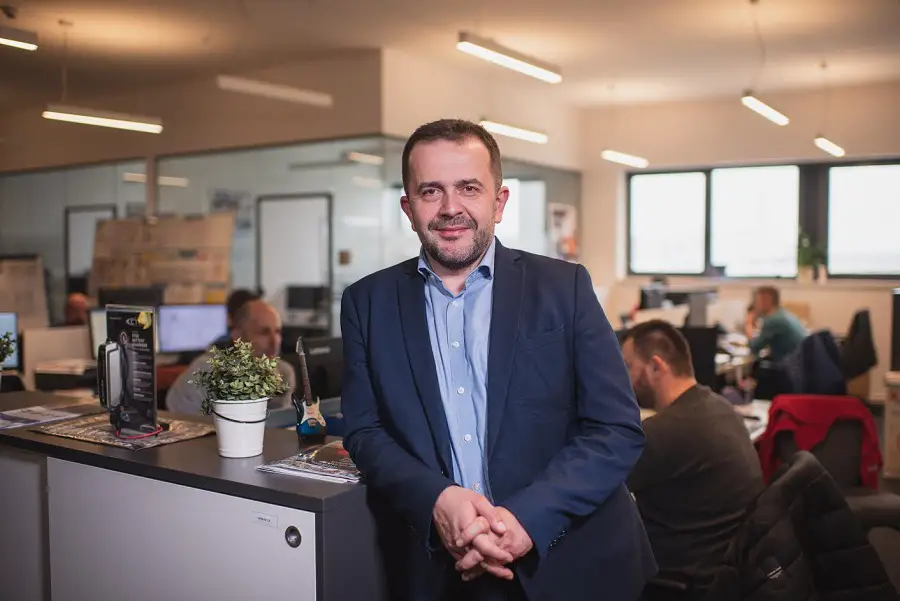
Oh, boy, how wrong could I be?
It didn't take me long to realise that I was in a very special environment, one which was light years away from the typical Croatian business mindset, and one which was not actually selling car parts as its primary focus, as the VERY charismatic and amiable CEO Ivan Gadze explained to me in a sentence:
“We are not selling car parts, we are building up people.”
So revolutionary is the approach of Tokic Croatia that when a Croatian portal did a feature on them back in 2016, it was under a headline which went something like – Is it Google or Facebook – no, Tokic. London or New York? No Sesvete.
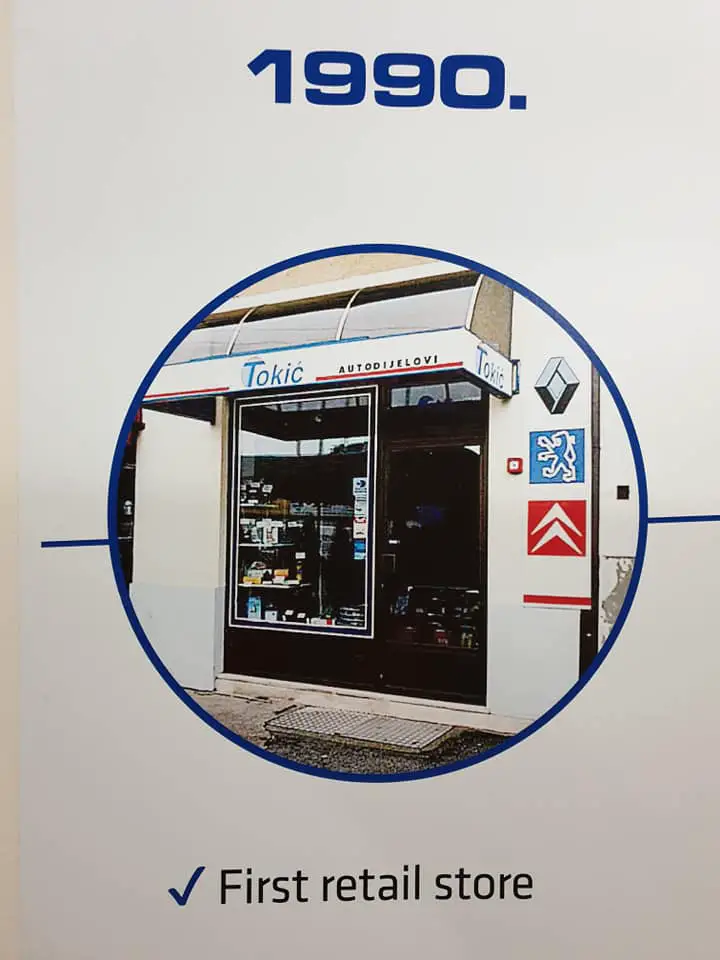
I am getting ahead of myself, so let's go back to the beginning. The year is 1990, and two brothers open a 35m2 retail outlet in Zagreb selling car parts. Things go well, and they expand. By 2000, there are 10 outlet stores in Zagreb, by 2014, over 100 in Croatia via a franchise model. In 2008, Tokic Croatia became a member and shareholder of ATR International AG in Germany. The company, although very successful, is still very traditional in an ever-changing world.
And then things changed.
The two founding brothers decided to step back and bring in professionals to work on the expansion and longterm sustainability of the company. Rarely for a family business, that decision meant an agreement that they abided by – to let the new management run things completely without family interference. Both brothers are part of the supervisory board, but the company is completely run by Gadze and his management team.
The decision was taken to build an innovative and agile company which invested heavily in human capital and kept itself at the forefront of new technology. A company which was open, innovative and inclusive, something very rare in Croatia, especially in a family company.
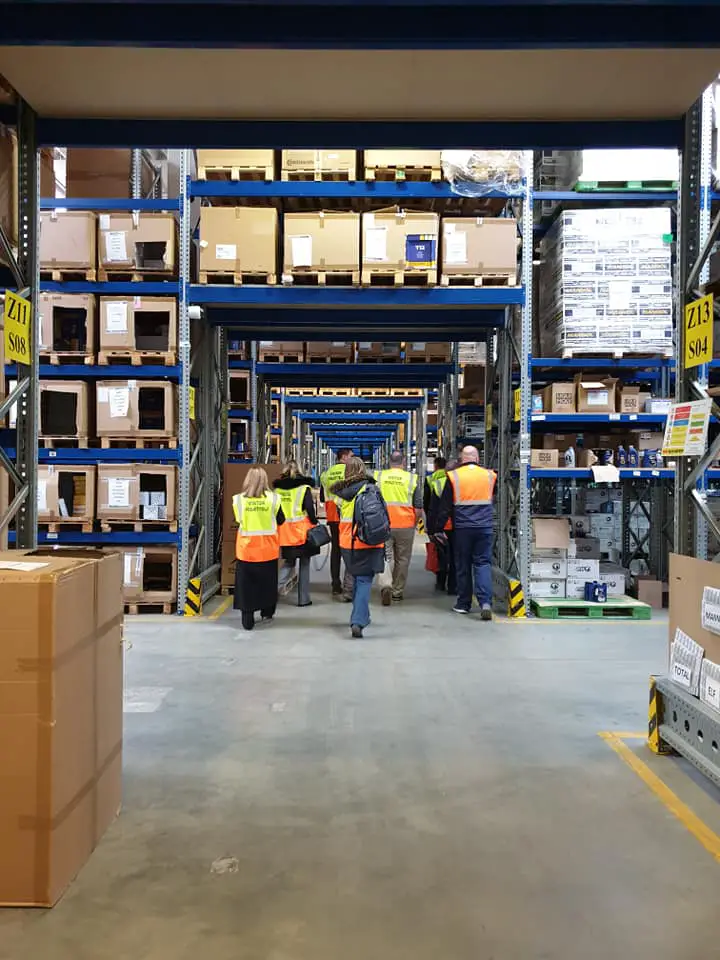
A new logistics centre, a gigantic 24,000 m2, was located in Sesvete (by way of comparison, IKEA Zagreb is 38,000 m2), and a new logistics operation began in 2016.
This included the moving of an incredible 1.1 million cases to the new location in 11 days by 140 people, without the supply chain of deliveries from suppliers and to customers being remotely interrupted. It was an incredible achievement, as Gadze explains in the video above, and one which is permanently recorded on the warehouse wall.
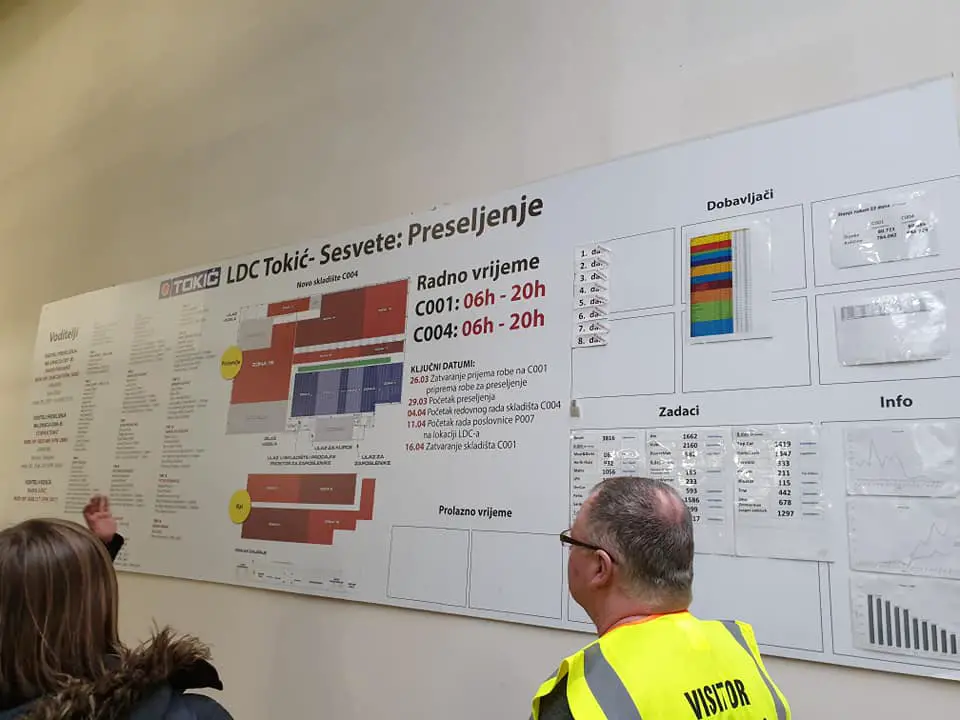
(The Hall of Fame of the incredible logistical move in 2016)
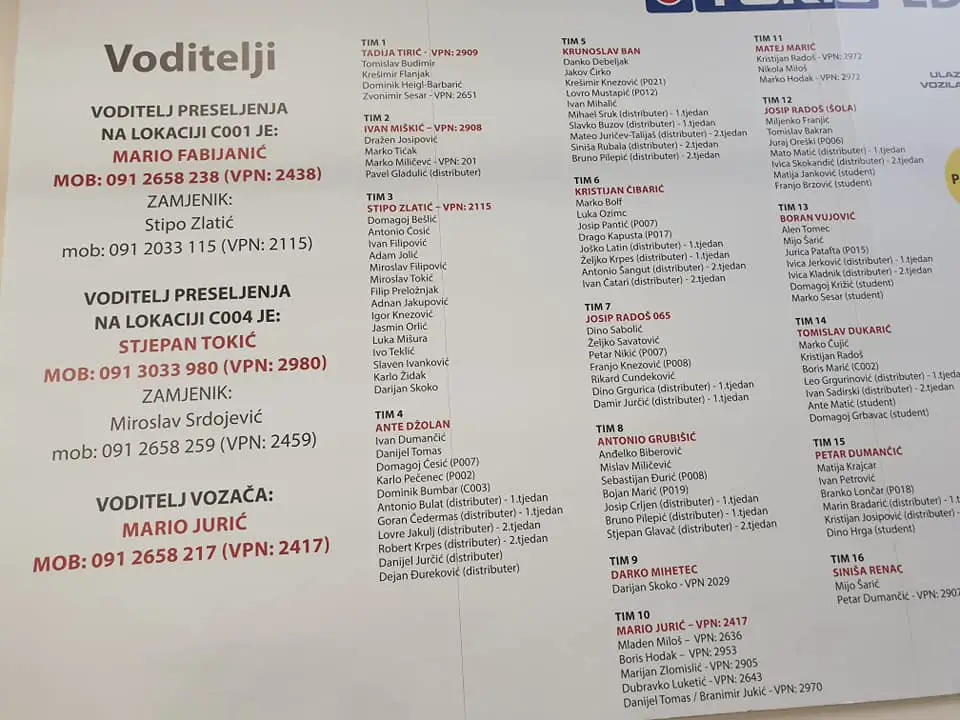
Where to start with the innovations? Perhaps with one of the reasons that the German minister visited. Tokic Croatia prides itself on its agility and innovation, and perhaps the best example of that is the fact that it became the first to implement robot technology from Gideon Brothers.
It was a perfect example of the Tokic agility. Gideon Brothers had a great concept but no implementing partner and they were talking to various companies. The two companies met on a Friday, signed a contract the following Monday and the first pilot started a month later.
It introduced the first concept shop for automotive spare parts in the region, something which did not even exist in Austria. Queueing machines are common in banks, but not in this industry, another introduction. In fact, quality control is in evidence wherever you walk in the Tokic offices – there are monitors in the sales department monitoring the length of time it takes to answer a call, and the percentage of missed calls. And the overwhelming desire from all I met was the desire to improve and do better.
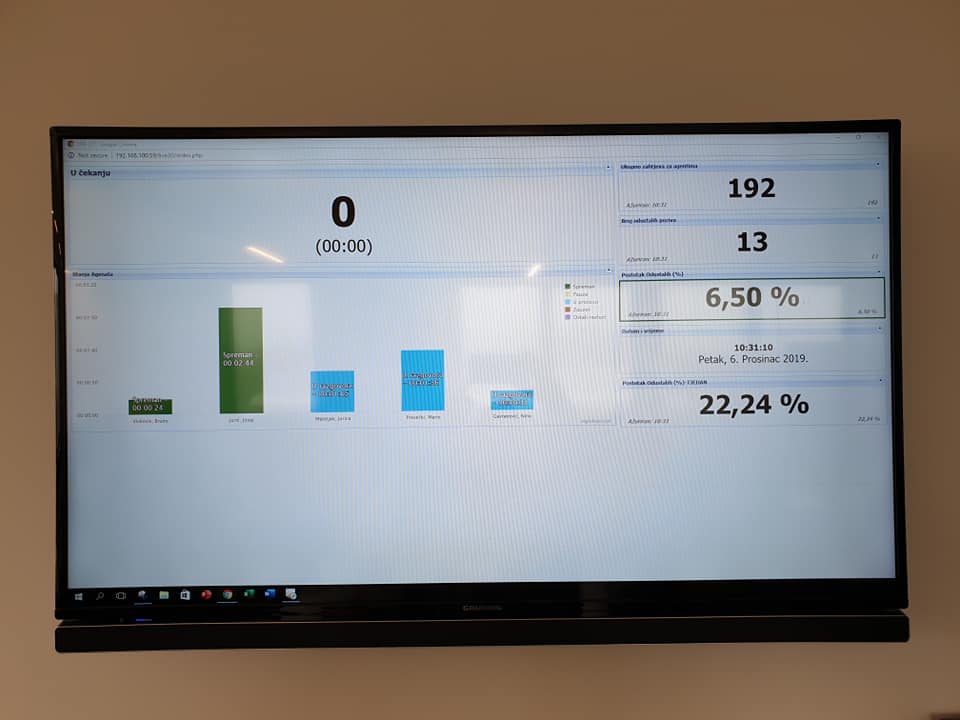
This is a company aiming for perfection, and I smiled internally when I asked about the delivery time from the concept store to the customer, as the sales assistant needed to go into that massive warehouse to find the part. While the delivery time is still very quick, it is not quick enough for the Tokic ethos, and I could tell that it troubled my guide, while knowing that a solution would not be far away.
The investment in human capital is everywhere to see. The Kaizen programme (the Japanese philosophy of continuous improvement), two trained staff in MBTI, the biggest global psychometric test or model for measuring the preferences of people. The T1 Walk internal education academy, with over 1 million euro invested. The Tokic Education Centre (TEC) is offered in association with the German Chamber of Crafts in Dortmund, a qualification which is therefore applicable in Germany and the wider EU.
People, people, people. Develop the human capital and the company will look after itself. And the results speak for themselves. In an era where Croatian companies complain that they cannot find quality staff, Tokic Croatia is finding that the opposite is true, and the best of the best are coming to them from the competition, and even returning from places like the UK.
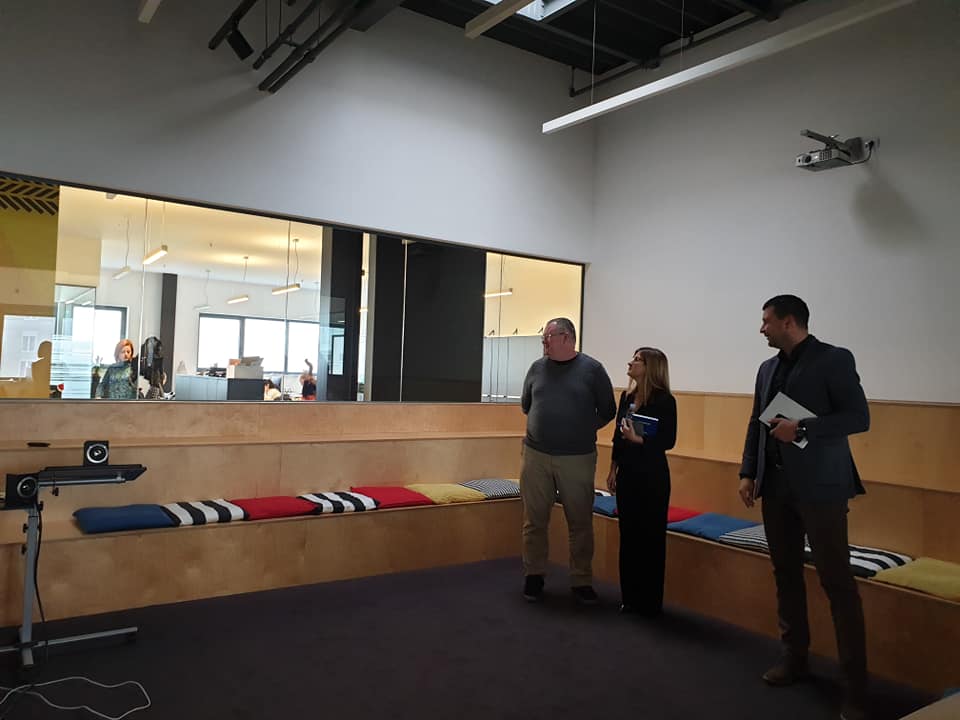
Walking around the very open and bright offices, it is not hard to see why. This is a company which started as a family business with two brothers, but which has grown into a much bigger family, bonded not by blood, but by company ethos, respect, diligence, transparency and a passion for improvement. Part of the reason might also be that the company is located in Sesvete, which not only has the highest population growth in Zagreb, but also apparently in the whole country.
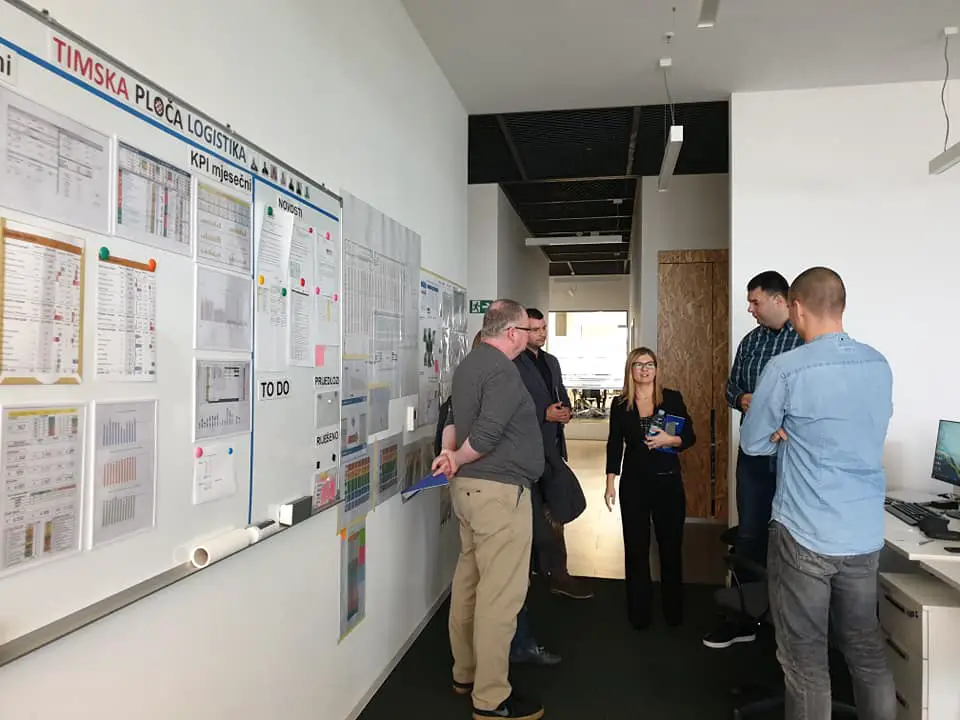
As we toured the office, we stopped to chat to some random employees about their experiences working at Tokic Croatia. Apart from the VERY relaxed office culture, it was their passion and ideas which left their mark, with one telling me about his sleepless night trying to fix a robotics programme.
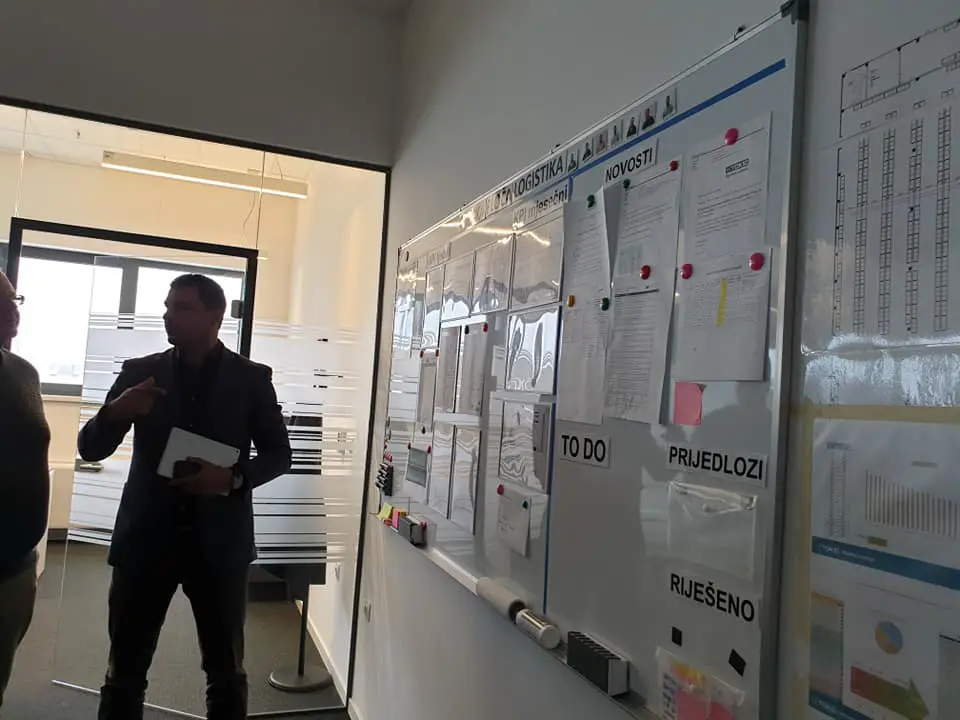
There are complaints procedures, as well as the chance to bring suggestions. Each department has a board on the wall where such things can be discussed and dealt with. I looked at several such boards on my walk around. Each had a box for Suggestions and one for Resolved. All the suggestions boxes were empty, dealt with and resolved as they came in.
Although Tokic Croatia is active in 14 countries, its core operations currently are in Croatia, Slovenia, Italy and Austria, and in those markets, it offers a quite extraordinary guarantee. Order your parts by 18:00 and it will be delivered the next day. Tokic is open to business east of Croatia (and has a partner in both Macedonia and Montenegro), but it sees itself very much as a European player of German quality serving the European market. They believe they have the product, the people and the know how, as well as that innovation and agility, to compete.
And so do others.
The London Stock Exchange chose Tokic Croatia as one of 13 European companies for its ELITE programme. Only this November, Tokic was listed in the illustrious LSE Future Shapers group of companies. And as one of 35 members of the 29 billion euro ATR International AG group, Tokic is one of the most visited companies by the other shareholders.
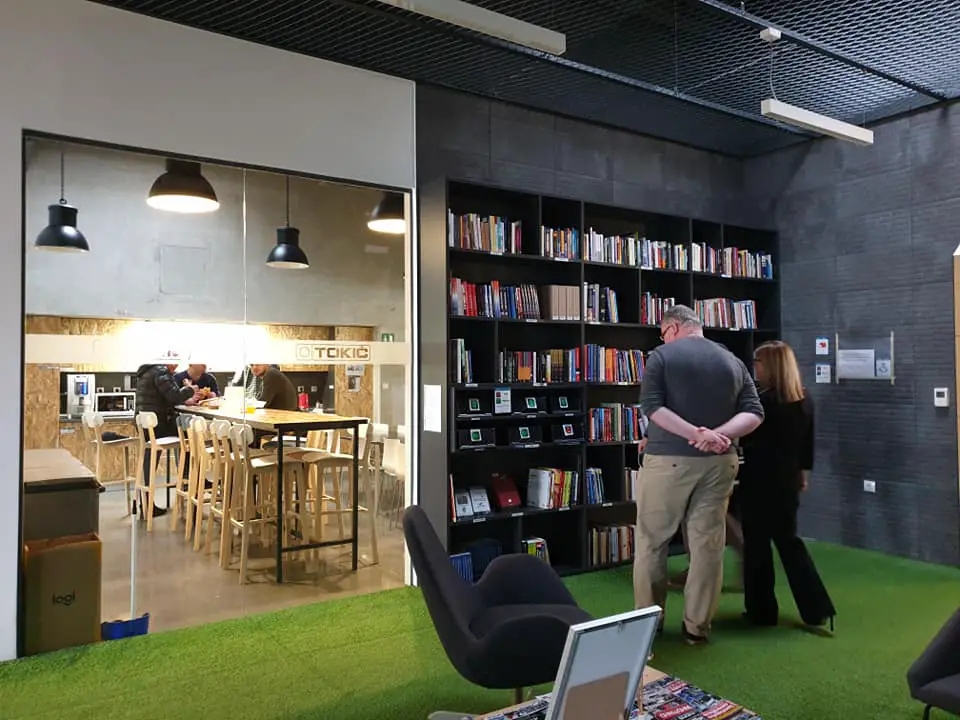
Walking around the offices is an uplifting and relaxing experience, and as far removed from any stereotype of a car parts company as you can imagine. Open plan, glass, but bright coloured chairs in chill zones, table football to take the stress away, even a book exchange library (where I was amused to note that the smallest section was called 'Automotive'). And everywhere there were smiles, dedication, purpose.
The culture of inclusion extends to lifestyle and partying, and Gadze told us how hospitality is one of the things for which Tokic Croatia is known. The company hosts about 12 big parties each year, the biggest this year being at their Expo in October, where 4,000 people partied into the night. But it is not just partying, sport is a major part of teambuilding. The Tokic racing team has 15 drivers, there is a football cup with 24 teams (all employees), a strong presence in the Advent in Zagreb run, table tennis, cycling, the list goes on.
And corporate and social responsibility.
The Tokic approach to education includes giving back to the community. They have, for example, a loyalty programme for mechanics, where 1 kuna in every 100 kuna is donated to a vocational school in Velika Gorica. And while they have little interest in professional sports, Tokic Croatia actively sponsors kids and sports. This includes the Christmas Cup in Dubrava, where the top teams in Europe bring their under-13 teams to compete in Zagreb. Luka Doncic was one past competitor.
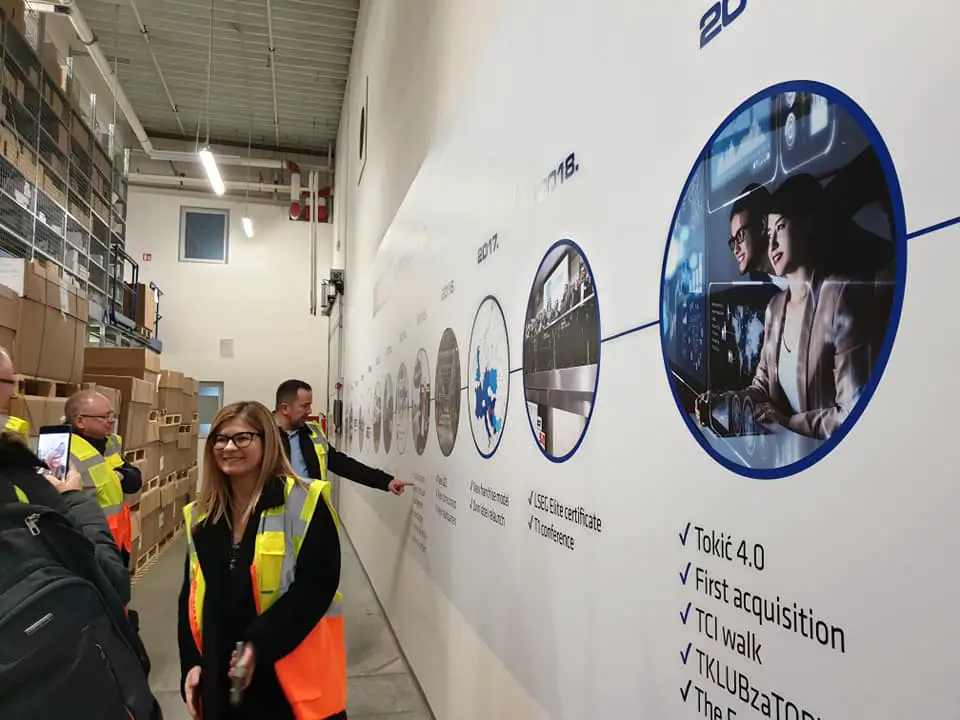
And what of the future for the company? The aim is to become a relevant Central European company in terms of size and revenue, to build the brand and trust in that brand, to keep at the cutting edge of technology and innovation. Telematics is one key area of future interest, as too is predictive maintenance, something which Tokic is already involved in with predictive analytics but not yet monetising.
Two hours just flew by, and the world of Croatian car parts was transformed before my very eyes.
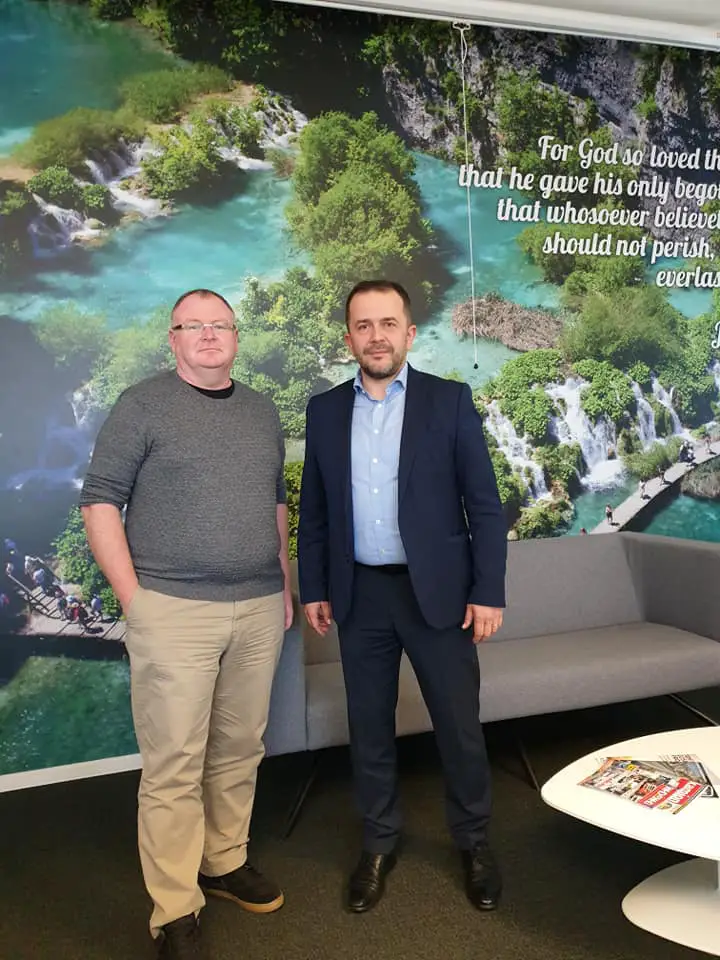
So just because Croatian companies do not always talk about their success, it does not mean that success is not happening. Quite the contrary, in fact, and while a visit to Tokic may be about a simple purchase of car parts on one level, that huge investment in human capital means the sale is taking place in one of the top 50 most innovative companies in Europe.






